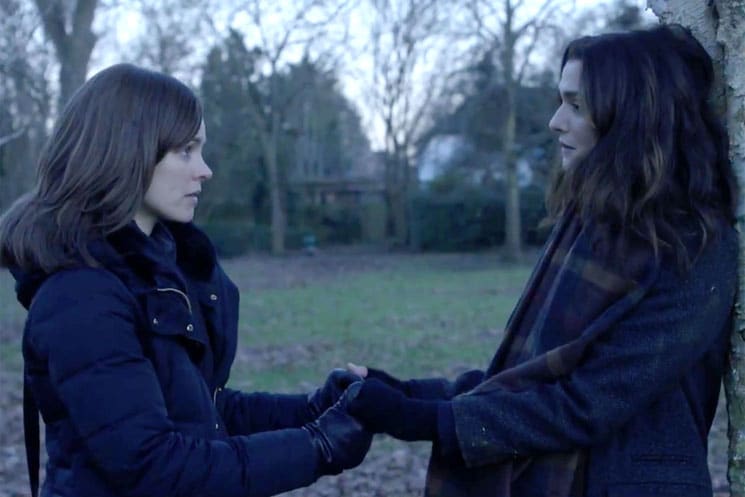Disobedience is a deceptively complex film. Its plot is innocuous enough: Ronit (Rachel Weisz), a liberal photographer, returns to the Orthodox Jewish community she grew up in after the death of her father, and reunites with her childhood best friend and onetime lover, Este (Rachel McAdams). There's enough in that sentence alone to drive two hours of storytelling and plenty more to think about afterward. It hits on several hot topics (religion, queerness, female companionship in the face of a patriarchal society) and features two stellar actors at the top of their games.
But rather than being driven by revelations and plot twists, the film is led by its characters, which the first third of the film spends delving into. Ronit, Este and the third member of their childhood trio, Dovid (Alessandro Nivola), are given time to showcase their nuances and ambitions before they inevitably careen into each other like a slow-motion train wreck. You see each facet of their lives slowly flying off the rails with rich, gruesome understanding of how and why.
The film is, at its core, a testament to the power of female companionship in a patriarchal society. While the details are rather literal — Ronit's late father, as the head rabbi, is the community's patriarch — and takes place in a community that explicitly marginalizes women and LGBTQ people (as opposed to, y'know, the rest of society), it never feels heavy-handed. Weisz and McAdams embody their characters' struggles for acceptance in a world that denies them freedoms both in gender and sexuality with trademark weight that makes for a compelling watch. Neither overshadows the other, and their chemistry is palpable as they portray the murky state that lies in the middle of best friends, confidantes and lovers.
It's the richness of Este and Ronit's relationship that gives the film its strength, as both characters are given the space individually to explore their pasts in relation to their vastly different presents, leading to a nuanced power dynamic as the film explores the various facets of their reignited relationship.
Their performances are buoyed by Nivola's portrayal of Dovid, who represents the top of the food chain, who embodies adherence to social norms without coming off as cruel and smarmy. Thanks to the pacing, which sets up the traditions and structures of Orthodox Judaism in order to knock them down later, Dovid's motivations are fully understood — it doesn't necessarily make him sympathetic in light of the other characters, but it stops him from becoming a monolithic personification of oppressive forces.
The way that the lead trio imbue their characters with flawed humanity, assisted by Sebastián Leilo and Rebecca Lenkiewicz's script and Leilo's direction, result in a thought-provoking look at the tenuous boundaries between faith and sexuality. Disobedience opens up necessary conversations on the role of queerness in religion, proving as vital a watch for its societal impact as well as its performances.
(Mongrel Media)But rather than being driven by revelations and plot twists, the film is led by its characters, which the first third of the film spends delving into. Ronit, Este and the third member of their childhood trio, Dovid (Alessandro Nivola), are given time to showcase their nuances and ambitions before they inevitably careen into each other like a slow-motion train wreck. You see each facet of their lives slowly flying off the rails with rich, gruesome understanding of how and why.
The film is, at its core, a testament to the power of female companionship in a patriarchal society. While the details are rather literal — Ronit's late father, as the head rabbi, is the community's patriarch — and takes place in a community that explicitly marginalizes women and LGBTQ people (as opposed to, y'know, the rest of society), it never feels heavy-handed. Weisz and McAdams embody their characters' struggles for acceptance in a world that denies them freedoms both in gender and sexuality with trademark weight that makes for a compelling watch. Neither overshadows the other, and their chemistry is palpable as they portray the murky state that lies in the middle of best friends, confidantes and lovers.
It's the richness of Este and Ronit's relationship that gives the film its strength, as both characters are given the space individually to explore their pasts in relation to their vastly different presents, leading to a nuanced power dynamic as the film explores the various facets of their reignited relationship.
Their performances are buoyed by Nivola's portrayal of Dovid, who represents the top of the food chain, who embodies adherence to social norms without coming off as cruel and smarmy. Thanks to the pacing, which sets up the traditions and structures of Orthodox Judaism in order to knock them down later, Dovid's motivations are fully understood — it doesn't necessarily make him sympathetic in light of the other characters, but it stops him from becoming a monolithic personification of oppressive forces.
The way that the lead trio imbue their characters with flawed humanity, assisted by Sebastián Leilo and Rebecca Lenkiewicz's script and Leilo's direction, result in a thought-provoking look at the tenuous boundaries between faith and sexuality. Disobedience opens up necessary conversations on the role of queerness in religion, proving as vital a watch for its societal impact as well as its performances.
